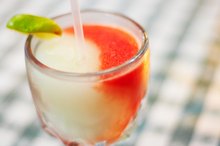What does fact checked mean?
At Healthfully, we strive to deliver objective content that is accurate and up-to-date. Our team periodically reviews articles in order to ensure content quality. The sources cited below consist of evidence from peer-reviewed journals, prominent medical organizations, academic associations, and government data.
The information contained on this site is for informational purposes only, and should not be used as a substitute for the advice of a professional health care provider. Please check with the appropriate physician regarding health questions and concerns. Although we strive to deliver accurate and up-to-date information, no guarantee to that effect is made.
How to Get Rid of Hangover Shakes
A hangover is a collection of symptoms that characterizes your body’s response to the withdrawal of alcohol. Common symptoms include shakiness, vertigo, mood problems, headache, nausea and sensitivity to light. There is no real cure for a hangover; it has to go away on its own. However, there are a few steps you can take to minimize your symptoms. You could also help prevent hangovers by eating before drinking, drinking slowly, limiting the number of drinks and sticking to only one kind of drink 1.
Drink liquids, such as fruit juice and water. Do not consume more alcohol; this can worsen your symptoms. Alcohol leads to overactive urination, which results in dehydration. This worsens hangover symptoms.
How Do You Get Alcohol Out of the Body?
Learn More
Raise your blood sugar. According to the Mayo Clinic, alcohol often results in a drop in blood sugar 1. This causes many hangover symptoms, including shakiness, fatigue and weakness. Eat bland foods. Stick to crackers, toast or bouillon soup to help settle your stomach and elevate your blood sugar to reduce shakiness.
Go to sleep after hydrating your body and eating. When you’re asleep, you won’t notice shakiness or other hangover symptoms. It’s also possible that your hangover will be completely gone by the time you wake up.
Related Articles
References
- The Mayo Clinic: Hangovers
- CNN Health: The Facts Behind Hangover Remedies
- Mackus M, van Schrojenstein Lantman M, Van de Loo AJAE, Kraneveld AD, Garssen J, Brookhuis KA, Verster JC. Alcohol metabolism in hangover sensitive versus hangover resistant social drinkers. Drug Alcohol Depend. 2018 Apr 1;185:351-355. doi: 10.1016/j.drugalcdep.2017.11.040. Epub 2018 Feb 21.
- van Schrojenstein Lantman M, van de Loo AJAE, Mackus M, Kraneveld AD, Brookhuis KA, Garssen J, Verster JC. Susceptibility to Alcohol Hangovers: Not Just a Matter of Being Resilient. Alcohol Alcohol. 2018 May 1;53(3):241-244. doi: 10.1093/alcalc/agx107.
- Mackus M, van de Loo AJAE, Raasveld SJ, Hogewoning A, Sastre Toraño J, Flesch FM et al. Biomarkers of the alcohol hangover state: Ethyl glucuronide (EtG) and ethyl sulfate (EtS). Hum Psychopharmacol. 2017 Sep;32(5). doi: 10.1002/hup.2624. Epub 2017 Jul 6.
- Jayawardena R, Thejani T, Ranasinghe P, Fernando D, Verster JC. Interventions for treatment and/or prevention of alcohol hangover: Systematic review. Hum Psychopharmacol. 2017 Sep;32(5). doi: 10.1002/hup.2600. Epub 2017 May 31.
- Jayawardena R, Thejani T, Ranasinghe P, Fernando D, Verster JC. Interventions for treatment and/or prevention of alcohol hangover: Systematic review. Hum Psychopharmacol. 2017 Sep;32(5). doi: 10.1002/hup.2600. Epub 2017 May 31.
- Mackus M, van de Loo AJAE, Raasveld SJ, Hogewoning A, Sastre Toraño J, Flesch FM et al. Biomarkers of the alcohol hangover state: Ethyl glucuronide (EtG) and ethyl sulfate (EtS). Hum Psychopharmacol. 2017 Sep;32(5). doi: 10.1002/hup.2624. Epub 2017 Jul 6.
- Mackus M, van Schrojenstein Lantman M, Van de Loo AJAE, Kraneveld AD, Garssen J, Brookhuis KA, Verster JC. Alcohol metabolism in hangover sensitive versus hangover resistant social drinkers. Drug Alcohol Depend. 2018 Apr 1;185:351-355. doi: 10.1016/j.drugalcdep.2017.11.040. Epub 2018 Feb 21.
- van Schrojenstein Lantman M, van de Loo AJAE, Mackus M, Kraneveld AD, Brookhuis KA, Garssen J, Verster JC. Susceptibility to Alcohol Hangovers: Not Just a Matter of Being Resilient. Alcohol Alcohol. 2018 May 1;53(3):241-244. doi: 10.1093/alcalc/agx107.
Writer Bio
Catherine Chase is a professional writer specializing in history and health topics. Chase also covers finance, home improvement and gardening topics. She holds a Bachelor of Arts in American studies from Skidmore College.









